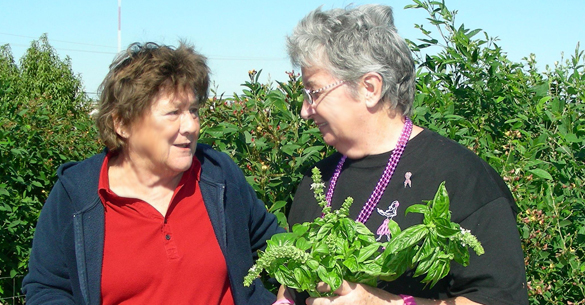
People garden for a variety of reasons, but the satisfaction of raising fresh, safe, wholesome foods is high on the list. Photo courtesy Education Community Garden, Urban Solutions Center, Dallas.
Talk to most vegetable gardeners and you’ll quickly find that pests and pesticides are hot-button topics. While pests are strongly disliked, most gardeners are reluctant to use pesticides on fruits and vegetables in their own gardens. This is understandable. While most of us, to varying degrees, accept the need for pesticides in commercial food production, the home vegetable garden is seen almost universally as the best place to get fresh, wholesome produce–without pesticides. Fortunately, you can grow produce in your home garden with minimal use of artificial pest control products. Using less and safer pesticides, however, means knowing more about pests and pest control methods.
General garden pest control
- Managing Insect and Mite Pests in Vegetable Gardens (E-194)
This publication provides an in-depth guide to the strategies, pests and pesticides that can be used in vegetable gardens. This attractive, 2008 publication is the principal AgriLife Extension reference to vegetable insect control. - The Vegetable IPM website
A joint project between the Entomology and Horticulture departments at Texas A&M University. - Homeowners guide to pests of peaches, plums and pecans (E-145)
A must-see guide to the various pests of stone fruits and pecans in Texas. When to look and when to take action against pests in order to get the best harvest. - Management of Insects on Herbs (UC-025)
A 1994 publication on pest management options in herbs. Some newer materials are available today, but herbs remain one of those crops with relatively few insecticide options.
Pests
- Identifying common caterpillar pests of vegetables (E-532)
A detailed identification guide to caterpillars found in Texas vegetable crops. Written for commercial growers, the fact sheet is provided with numerous color pictures that will help home gardeners accurately identify most of these insects. No control information. - Earwigs (E-213) With their pincers and distinctive shape, earwigs are one of the most commonly noticed soil-inhabiting garden arthropods. While earwigs are rarely serious pests, you will want to know more about these interesting insects.
- Pillbugs (ENT-1006)
An under-appreciated garden pest, that is also one of the most common arthropods in gardens and landscapes. Don’t underestimate the damage pillbugs can do to some garden plants.
Pest control methods
- Water wands: Using water to control small insects and mites on vegetables (EEE-00006)
Some vegetable pests can be controlled without pesticides by simply blasting them off the plant with water. Effective and fun! - Understanding common house and garden insecticides (ENT-4002)
A useful guide to understanding insecticide classes, formulations and application terms. Identifies low-impact insecticide choices, and gives examples of trade names. - Low-impact Insect Control for Everyone (leaflet)
Low-impact insecticides are products that pose especially low risk to people, pets and non-target insects. This leaflet explains the low-impact concept and give examples of products as close as your nearest grocery store or garden center. - Mulching for Easy Gardening (E-512)
While not about vegetable insect control, per se, this publication explains important garden mulching techniques. Mulches help keep soil moisture levels even, making for healthier, more pest-tolerant plants. As the publication notes, a well-mulched garden can yield 50 percent more vegetables than can an unmulched
garden the same size. Also, some of the reflective mulches have been show to repel insects in commercial operations. - Doug Welsh’s Texas Garden Almanac (SP-349)
A For Sale ($25) publication by Extension horticulture specialist, Doug Welch. Contains gardening information, arranged by month to help you plan your gardening tasks. Includes information on garden design, soil, mulch, water, pests, plant care and much more.
There are many other AgriLife publications on general gardening. Most of these have been recently updated and given a clean, new look. Check them out by going to http://agrilifelearn.tamu.edu and searching on the keyword “vegetable”.